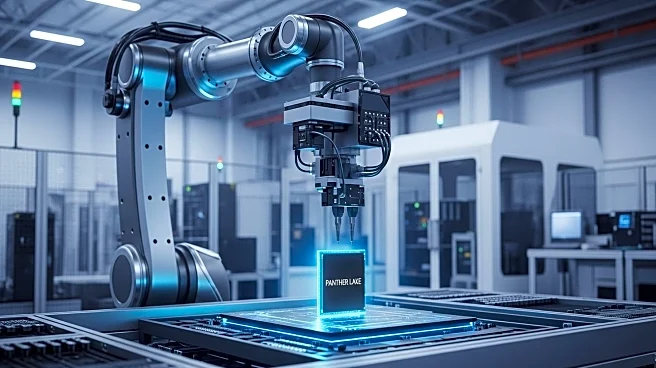What is the story about?
What's Happening?
Intel Corporation has unveiled its new Panther Lake processor, part of the Intel Core Ultra Series 3, which extends its applications to robotics. The company has developed an Intel Robotics AI software suite and reference board to enable customers to innovate and develop cost-effective robots using Panther Lake for controls, AI, and perception. High-volume production is set to begin this year, with the first SKU shipping before the end of the year and broad market availability starting January 2026. Panther Lake is Intel's first product built on the 18A semiconductor process, claimed to be the most advanced ever developed and manufactured in the U.S. This process introduces a scalable, multi-chiplet architecture offering flexibility across form factors, segments, and price points.
Why It's Important?
Intel's expansion into robotics with the Panther Lake processor signifies a major advancement in semiconductor technology, potentially revolutionizing the robotics industry. By leveraging the 18A process, Intel aims to enhance performance and energy efficiency, which could lead to more sophisticated and cost-effective robotic solutions. This development underscores Intel's commitment to U.S. manufacturing, aligning with national priorities and providing strategic capacity for Intel Foundry customers. The move could bolster the U.S. semiconductor industry, fostering innovation and maintaining competitiveness in global markets.
What's Next?
Intel plans to ramp up high-volume production of Panther Lake processors, with broad market availability expected in January 2026. The company is also previewing its Clearwater Forest server processor, slated for launch in the first half of 2026. This processor is tailored for hyperscale data centers, cloud providers, and telcos, enabling organizations to scale workloads and reduce energy costs. Intel's investment in U.S. manufacturing, including the new Fab 52 facility in Arizona, is part of a $100 billion expansion of domestic operations, positioning the company to support key national priorities.
Beyond the Headlines
Intel's advancements in semiconductor technology could have long-term implications for the U.S. economy and global competitiveness. The introduction of the 18A process and the expansion of domestic manufacturing capabilities may enhance the U.S.'s strategic position in the semiconductor industry. Additionally, the focus on AI and robotics could drive innovation across various sectors, potentially leading to new applications and business models.
















